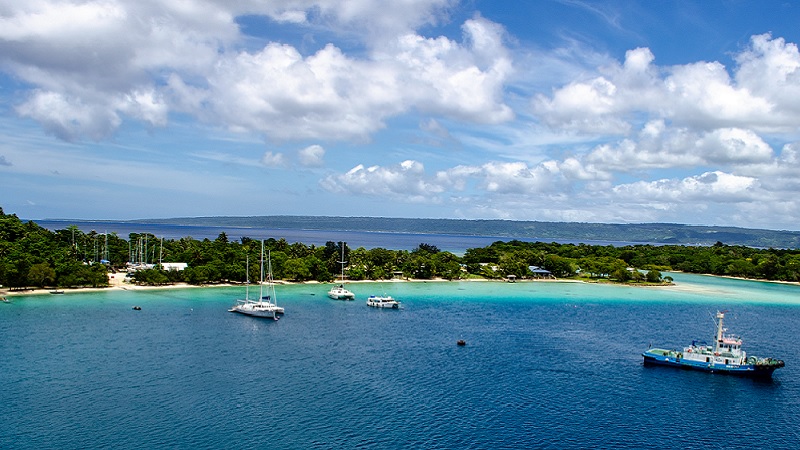Australia must ‘partner-up’ in the Pacific
June 03 2022

By Corey Lee Bell and Elena Collinson
Note: This article appeared in the Asia & the Pacific Policy Society at the Australian National University’s blog, Policy Forum, on June 3 2022.
China loomed large in Australia’s federal election, after the Solomon Islands Government decided to sign a security pact with the country in April.
This decision turned out to be an ill-timed disaster for the outgoing conservative Liberal-National government, and was branded by then-Shadow Foreign Minister Penny Wong as “the worst Australian foreign policy blunder in the Pacific since the end of World War Two.”
With fears growing that the agreement could allow China to set up military facilities less than 2,000 kilometres from Australian shores, and after China’s recent attempt to sign a trade and security pact with 10 Pacific Island nations, Australia’s newly elected Labor government faces a major challenge of restoring Australia’s status as “the partner of choice in the Pacific.”
That work has already begun, with Foreign Minister Wong following up Australia’s attendance at the Quadrilateral Security Dialogue – or ‘Quad’ – meeting in Tokyo with a flash visit to Fiji – days ahead of a scheduled visit to that nation from Chinese Foreign Minister Wang Yi.
Former Prime Minister Scott Morrison’s recent admission that Pacific Island countries had been treated as a “bit of an extension of our own country” reveals the necessity for this outreach, and the extent to which Australia’s promotion of a ‘free and open Indo-Pacific’ have rung hollow in the region.
It is the type of treatment that led to Fiji’s Prime Minister Frank Bainimarama claim in 2019 that Chinese representatives were “definitely” better than an “insulting and condescending” Morrison, and prompted former president of Kiribati, Anote Tong, to claim that China is the “the lesser of the two evils.”
As China continues to step up its efforts to increase its security footprint in the region, making up for this lost ground might prove increasingly difficult – especially in view of marked asymmetries between China and Australia’s diplomatic and economic tool kits.
Certainly, the sophistication of China’s diplomacy has been understated in ministerial statements and in the Australian media. However, Australia is also constrained in ways that China isn’t.
It will not, for example, bribe politicians, as China allegedly did, in order to get Solomon Islands’ parliament to vote to end its diplomatic recognition of Taiwan.
Perhaps the biggest challenge is that aid and investment dependence is not in Australia’s favour. In 2020, Solomon Islands’ exports to China were 72 times larger than those to Australia.
China has also been achieving more diplomatic bang for its aid and development bucks. Yes, Australia’s aid to Solomon Islands outmatches China’s. In 2019, Australia provided more than $174 million in aid to the country, whereas China’s aid was $50 million dollars in the same year. But this has not translated into diplomatic capital in the country. Most importantly, if competition for influence intensifies, Australia won’t have the same capacity in terms of scalability.
What Australia thus needs to do is work with partners that can help it address the marked asymmetry in diplomatic capital between China and Australia.
To an extent, Australia is already partnering up – especially with the United States and Japan. The Australia-US Strategic Partnership on Energy in the Indo-Pacific has sought to address the needs of Pacific countries since 2018, undertaking substantial work to develop Internet and telecommunications infrastructure in the region.
But these joint efforts have been unable to address the slide in Australia’s diplomatic standing in the South Pacific. Australia was the subject of criticism in the wake of the 2019 and 2021 Pacific Island Forum meetings, just as many of these programs were beginning to ramp up. Indeed, the Solomon Islands-China security pact proceeded less than a year after Australia committed funding to a project aimed at providing hydropower generated electricity to Solomon Islands.
The failure of such joint investments to bear diplomatic fruit lends to a clear conclusion – Australia must build partnerships with other countries outside its traditional security partners, with whom it recently entered into the ‘AUKUS’ agreement, and outside the Quad.
Australia’s constant cooperation with the United States and its Quad and AUKUS groupings over other partners is fuelling perceptions of a creeping securitisation of Australia’s relationship with Pacific Island countries – which they fear could wedge them between competing powers and reduce rather than enhance regional stability. It appears to be this same fear that led to Pacific nations’ recent rejection of China’s multilateral security pact proposal.
So where should Australia look?
It should consider countries like South Korea. In late 2017, it launched its New Southern Policy strategy to dramatically improve cooperative ties with the Association of Southeast Asian Nations (ASEAN) in people-to-people links, trade, and aid to build regional stability.
This policy has thus far resulted in a 73 per cent boost in South Korea’s investments into Southeast Asia and India and a dramatic improvement in perceptions of relations. While the policy is currently limited to ASEAN, the South Korean government has already held discussions with the United States on how this can support its broader vision of a free and open Indo-Pacific.
By partnering with a country like South Korea, drawing on its expertise in high-tech manufacturing and digital infrastructure, Australia could engage in a less securitised form of diplomacy in the Pacific. Such partnerships also have the potential to grow the ecosystem of aid, investment, and trade in the region.
In a best-case scenario, such partnerships could form the beginnings a loose grouping that could match China’s promises in the region, and do so while ameliorating fears of locking vulnerable states into a high stakes, zero sum security contest.
For Australia, this could mean they’re no longer seen as one of the ‘evils’, and instead ensure it remains a key trusted partner in the region.
Dr Corey Lee Bell is a Project and Research Officer at the Australia-China Relations Institute, University of Technology Sydney (UTS:ACRI). Elena Collinson is a senior researcher at the Australia-China Relations Institute, University of Technology Sydney.


